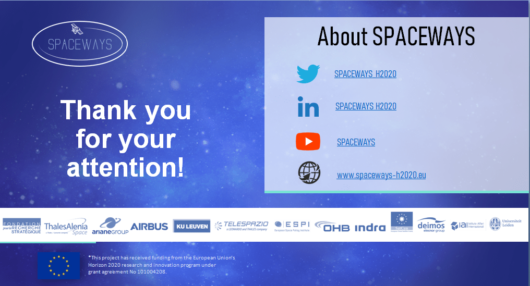
22 European entities were debriefed on the progress and main findings of the SPACEWAYS project and provided feedback for the final phase of the project
In November 2021, and following the first round of workshops, three virtual workshops were organised as part of the SPACEWAYS’ Stakeholders Engagement Programme, to present the progress of the project and the main findings on the current legal, policy and economic framework, SSA/SST technological analysis, and STM technical regulations for the sustainable use of Space. The workshops included dedicated presentations from project partners, and feedback and suggestions from institutional, operators, and R&D stakeholders for the following phases of the project were collected.
This time, more than 100 participants took part in the different workshops, including institutional actors (national agencies, Ministries of Defence, intergovernmental organisations, and EU institutions), public and private satellites operators, Space Surveillance and Tracking (SST) service providers, and R&D related entities (SME, start-ups, and a non-profit organisation).
The events were split into sessions tackling the different topics, which were followed by open discussions with the stakeholders on specific open points. In relation to the current legal, policy, and economic framework, interesting debates took place on potential ESA and EU cooperation schemes, ideal STM administration and its associated time constraints, the importance of data sharing interoperability, transparency and massive data sharing, the need of active debris removal framework, the STM expected economic impact and potential funding models, the civil-military duality, and the blueprint of the aviation sector.
Regarding the SSA/SST Technological Analysis for STM monitoring, discussions focused on the main goals of the European STM, the relevance of precise data sharing, collision risk management and sensitivity analysis, the need of empowered operators, the assessment of risk mitigation strategies, as well as the definition and implementation of rules.
Finally, with regards to STM Technical Regulations for a Sustainable Use of Space, an exchange of ideas developed around the need to focus on cooperation, efficiency of investments and innovation, the different scenarios that could be subject to the rules of the road, the convenience of tagging new protected regions, the importance of trust and transparency in the process of sharing orbital data, and the need for standardised end-of-life manoeuvres and operations for active re-entry manoeuvres.
What’s next?
The third round of SPACEWAYS stakeholders’ workshops is scheduled in Q2 2022 and will serve to present the outline of possible recommendations for a successful European approach to STM.
The SPACEWAYS project has received funding from the European Union’s Horizon 2020 research and innovation programme under grant agreement No 101004208. This article reflects only the view of the author(s) and the European Commission is not responsible for any use that may be made of the information it contains. The consortium is formed by Airbus Defence and Space, Arianegroup, Deimos Engineering and Systems, European Space Policy Institute, Fondation pour la Recherche Stratégique, Indra Sistemas, International Institute of Air and Space Law at Leiden University, Istituto Affari Internazionali, Leuven Centre for Global Governance Studies at Katholieke Universiteit Leuven, OHB System, European Union Satellite Centre, Thales Alenia Space, and Telespazio. Arianespace and Deimos Space are also involved as third parties to this project.



